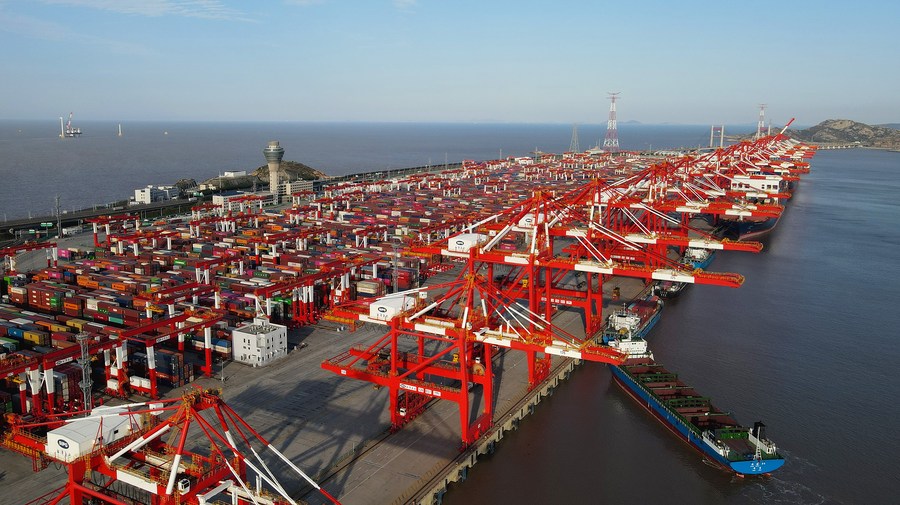Trade taking region down recovery path
By YANG HAN in Hong Kong | CHINA DAILY | Updated: 2021-11-19 09:21

Moves for expanded economic links drive hopes amid openness, experts say
Countries in the Asia-Pacific region can count on the benefits of moves toward greater economic integration and freer trade to drive recovery as the pandemic's impact wanes, experts say.
They are encouraged by the opportunities arising from the Regional Comprehensive Economic Partnership, or RCEP, which takes effect next year, and the supportive voices from government leaders for more cooperation.
Wisarn Pupphavesa, a senior adviser for international economic relations at the Thailand Development Research Institute, said the spirit of openness espoused at the recent Asia-Pacific Economic Cooperation leaders meeting points to the prospect of a better allocation of resources and more efficient production in the region.
"Many regional countries are small countries, so they cannot achieve a (high level of) efficiency in production and resource allocation,"Wisarn said. Countries, especially the smaller ones, will benefit from opening up, even if such moves are undertaken unilaterally, Wisarn said.
During and after the New Zealand-hosted APEC meeting, government leaders and international organizations have stressed the importance of trade and investment for speeding up economic recovery.
Many economies in the region have accelerated measures related to transparency and institutional coordination, and they have simplified customs procedures and expedited clearance processes, according to a report released by the World Trade Organization on Tuesday.
The report noted that multilateral and regional trade cooperation is conducive to effective global responses to future crises.
"A lot of countries will probably need a lot more free and open trade moving forward, given that we have got quite a lot of setbacks (during the pandemic)," said Siah Hwee Ang, a professor of international business and strategy at the Victoria University of Wellington.
The rest of the world will likely rely on the Asia-Pacific region for economic growth, the academic said.
Manu Bhaskaran, the chief executive of Centennial Asia Advisors, an economic consultancy in Singapore, said the momentum for free trade must be maintained as much as possible at a time of growing protectionism.
The adviser said China's application to join the Comprehensive and Progressive Agreement for Trans-Pacific Partnership will contribute a lot to the promotion of free and open trade as the pact addresses issues such as intellectual property protection, cross-border data flows and e-commerce.
Expectations are already high with the RCEP-signed by the members of the Association of Southeast Asian Nations and its five major trading partners including China-taking effect on Jan 1.
Strong signal
Dipinder Singh Randhawa, adjunct senior fellow at the S Rajaratnam School of International Studies in the Nanyang Technological University in Singapore, said the RCEP sends a strong signal that at a time when multilateralism is in retreat, the Asia-Pacific region is willing to commit itself to free trade.
However, Randhawa said the pandemic has exposed "the fault-lines underlying the multilateral trading system".
While rich countries have been averse to sharing their vaccines, the World Health Organization has also failed to persuade major economies to collaborate for common interest. That means endeavors such as the COVAX facility-created to ensure equitable distribution of vaccines-has fallen far short of expectations, said Randhawa. "Any kind of restrictions on trade that are agreed upon at the WTO can be overridden on account of 'national security' considerations," he said.
Wisarn said countries in the Asia-Pacific should not halt in their efforts for greater openness in the region.
Ang, noting the talk by some about so-called vaccine diplomacy, with the claim that some countries are trying to win favor by providing help with vaccines, said such people are being overly political about the issue.
"If some countries are being accused of helping others ... are we saying that maybe they shouldn't help?" Ang said. The academic noted cooperation on vaccines is about the survival of mankind.
























